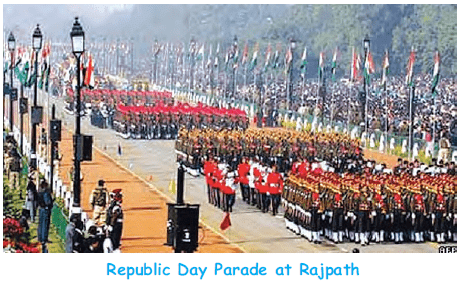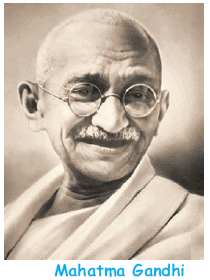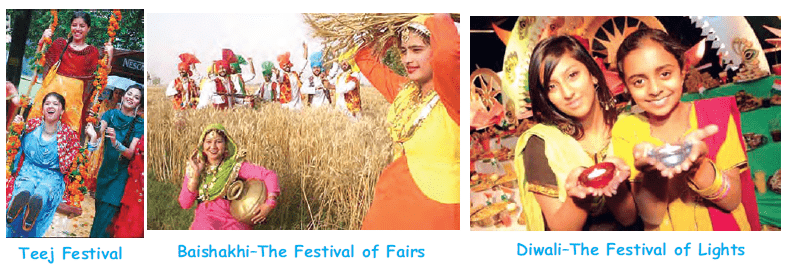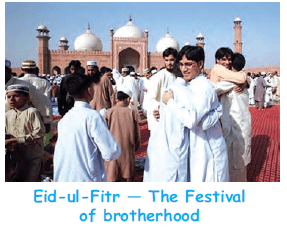Festivals of India Class 3 Notes SST
Our country India is a multi-religion country. Therefore, we get an opportunity to celebrate many festivals related with religions. Some of the religious festivals can be said to be harvesting festivals. Then there are National Festivals. We have a galore of festivals.
Every festival brings joy and happiness. Some of these remind us about important milestones in our history. All of them bring people of India together.
National Festivals
The three main National Festivals are Republic Day, Independence Day, and Gandhi Jayanti.
On all the three days, schools organize special functions to commemorate the importance of these occasions.
The Nation also celebrates these festivals in grand way.
Independence Day is celebrated on 15th August every year.
The Prime Minister hoists the national flag at the Red Fort. Functions are held in schools and at State capitals. The national flag is put up on government buildings on this day. It marks the end of British rule over our country.
On January 26, 1950 India became a Republic. Republic Day celebrations are held on a large scale in New Delhi. Military Parade and colourful tableaus (Jhankis) mark the Republic Day celebrations. Children who have done acts of bravery are part of the Republic Day parade in New Delhi. Folk dancers from different parts of the country are also part of the parade. Republic day is also celebrated in other parts of the country and by Indians in foreign countries.

Gandhi Jayanti is also a national festival. This is celebrated on 2nd October every year. It marks the birthday of Mahatma Gandhi. He led the freedom struggle. He is known as Father of the Nation.
On festival days people from all walks of life come together.
They join each other in festivities.

Religious Festivals
Teej is celebrated mostly by women in northern parts of the country. They wear pretty colourful dresses on this day. Swings are set up on the trees and groups of women enjoy them. Baisakhi is marked with Fairs. Men and Women dance in joy as the crops are ready for harvest. On Basant (spring). Kite flying is a popular pastime. Women wear Basanti clothes. The festival marks the end of the winter. On this day farmers worship their plough, students worship Saraswati-Goddess.... Goddess of learning.

Diwali is the festival of lights. Laxmi, the Goddess of wealth is worshipped on this day. Crackers and sweets mark the return of Lord Rama to Ayodhya. The festival is also the time for cleaning and decorating homes.
Holi is the festival of colours. Bonfire and splash of colours mark the festival. Special eatables are prepared on the occasion. Holi symbolises mutual brotherhood.

Dussehra comes before Diwali. On this day the demon Ravana was killed by Lord Rama. Tall effigies of Ravana and his brothers Meghnath and Kumbhkaran are erected and set to fire. Before Dussehra Ram Lila is held in all parts of the country. Dussehra is a special event in Kullu and Mysore. The festival marks the victory of truth over evil.

Eid-ul-Fitr is celebrated by Muslims in all parts of the world. For a whole month, Muslims keep fast during the day. The month is called Ramzan. Eid-ul-Fitr is celebrated after the 29th or 30th day of the fasts. People pray together and greet each other. Children wear new clothes and share food with friends and neighbours. Sewian is prepared on Eid.

Christians celebrate Christmas on 25th December as the day when Jesus Christ was born.
Prayers and cakes mark the festivities. Santa Claus is believed to bring gifts for children on the eve of christmas.

Durga Puja is an important festival celebrated by Bengalis.
Ganesh Chaturthi is the most popular festival among Maharashtrians.

Things to Remember
- Most of our festivals are related to religious occurances. Some festivals are related to seasons.
- Republic Day (26th January), Independence Day (15th August) and Gandhi Jayanti (2nd October) are our National festivals.
- Festivals provide a change from our daily routine. These are occasions for people of all communities to come together and enjoy.
|
15 videos|85 docs|22 tests
|
FAQs on Festivals of India Class 3 Notes SST
| 1. What are some examples of national festivals in India? |  |
| 2. What are religious festivals? |  |
| 3. Can you give some examples of religious festivals in India? |  |
| 4. Why are festivals important in India? |  |
| 5. How do people celebrate festivals in India? |  |


















